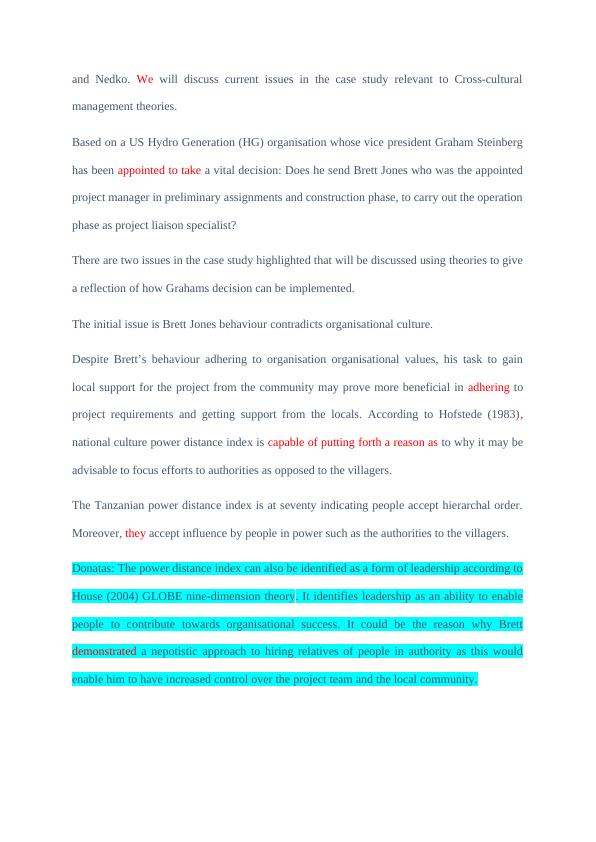What to do when a manager goes native transcript
Added on 2023-04-06
7 Pages1528 Words284 Views
Students ID Number
(Do not include student name as
anonymous marking is
implemented)
MEN18457709/ JUR16423358/ ORC16423328/ ARG16423343/
MIN16423096
Programme Title Business Management and Entrepreneurship
Module Title Cross-Cultural Management
Module Code (listed on Moodle
and in LTAFP) QAB020N504S
Module Convenor Joy Umekwe
Coursework Title What to do when a manager goes native transcript
Academic Declaration:
Students are reminded that the electronic copy of their essay may be checked, at any point during their
degree, with Turnitin or other plagiarism detection software for plagiarised material.
Word Count 1249 Date Submitted 18/03/2019
What to do when a manager goes native podcast
Joel: Hello my name is Joel and you are listening to the cross-cultural management podcast
on what to do when managers go native. I would like to introduce Donatas, Marta, Antonella
(Do not include student name as
anonymous marking is
implemented)
MEN18457709/ JUR16423358/ ORC16423328/ ARG16423343/
MIN16423096
Programme Title Business Management and Entrepreneurship
Module Title Cross-Cultural Management
Module Code (listed on Moodle
and in LTAFP) QAB020N504S
Module Convenor Joy Umekwe
Coursework Title What to do when a manager goes native transcript
Academic Declaration:
Students are reminded that the electronic copy of their essay may be checked, at any point during their
degree, with Turnitin or other plagiarism detection software for plagiarised material.
Word Count 1249 Date Submitted 18/03/2019
What to do when a manager goes native podcast
Joel: Hello my name is Joel and you are listening to the cross-cultural management podcast
on what to do when managers go native. I would like to introduce Donatas, Marta, Antonella

and Nedko. We will discuss current issues in the case study relevant to Cross-cultural
management theories.
Based on a US Hydro Generation (HG) organisation whose vice president Graham Steinberg
has been appointed to take a vital decision: Does he send Brett Jones who was the appointed
project manager in preliminary assignments and construction phase, to carry out the operation
phase as project liaison specialist?
There are two issues in the case study highlighted that will be discussed using theories to give
a reflection of how Grahams decision can be implemented.
The initial issue is Brett Jones behaviour contradicts organisational culture.
Despite Brett’s behaviour adhering to organisation organisational values, his task to gain
local support for the project from the community may prove more beneficial in adhering to
project requirements and getting support from the locals. According to Hofstede (1983),
national culture power distance index is capable of putting forth a reason as to why it may be
advisable to focus efforts to authorities as opposed to the villagers.
The Tanzanian power distance index is at seventy indicating people accept hierarchal order.
Moreover, they accept influence by people in power such as the authorities to the villagers.
Donatas: The power distance index can also be identified as a form of leadership according to
House (2004) GLOBE nine-dimension theory. It identifies leadership as an ability to enable
people to contribute towards organisational success. It could be the reason why Brett
demonstrated a nepotistic approach to hiring relatives of people in authority as this would
enable him to have increased control over the project team and the local community.
management theories.
Based on a US Hydro Generation (HG) organisation whose vice president Graham Steinberg
has been appointed to take a vital decision: Does he send Brett Jones who was the appointed
project manager in preliminary assignments and construction phase, to carry out the operation
phase as project liaison specialist?
There are two issues in the case study highlighted that will be discussed using theories to give
a reflection of how Grahams decision can be implemented.
The initial issue is Brett Jones behaviour contradicts organisational culture.
Despite Brett’s behaviour adhering to organisation organisational values, his task to gain
local support for the project from the community may prove more beneficial in adhering to
project requirements and getting support from the locals. According to Hofstede (1983),
national culture power distance index is capable of putting forth a reason as to why it may be
advisable to focus efforts to authorities as opposed to the villagers.
The Tanzanian power distance index is at seventy indicating people accept hierarchal order.
Moreover, they accept influence by people in power such as the authorities to the villagers.
Donatas: The power distance index can also be identified as a form of leadership according to
House (2004) GLOBE nine-dimension theory. It identifies leadership as an ability to enable
people to contribute towards organisational success. It could be the reason why Brett
demonstrated a nepotistic approach to hiring relatives of people in authority as this would
enable him to have increased control over the project team and the local community.

Tanzania is within GLOBE`s cluster of countries set to Identify any universally accepted
leaders’ behaviour, attributes and organisational practices. Furthermore, how do national and
organisational cultures affect accepted and effective leaders’ behaviour.
Changing managers could confuse subordinates in a high-power distance society like
Tanzania and could affect leadership of the project. Moreover, this may be why Brett has
chosen a particular employee pool related to people with authority to maintain be seen as the
leader of the project.
House’s 9-dimension leadership theory links to Hofstede’s power distance theory indicating
followers are expected to obey their leaders without question. This explains as to why focus
towards authorities as opposed to villagers may be more effective when gaining local support
for the project.
Joel: Another dimension from national culture to consider is the long-term orientation.
Tanzania scores a value of thirty-four indicating a normative, short-term oriented culture
where the community is more likely to exhibit great respect for traditions as opposed to
economic pragmatism. This may empathise on why Brett has demonstrated unethical
managerial approaches such as Bribery to meet the project requirements as this may be
required in showing a level of respect for tradition.
Donatas: Tanzania being a normative, short-term oriented culture also links to GLOBE`s
Future orientation theory suggesting more people live for the present than the future. This can
provide an additional reason to Brett’s demonstration of nepotistic work ethic assuming the
societies collective mindset would provide loyalty when hiring close relatives.
Marta: When taking into account Tanzanian national culture and Bretts leadership style
Herzberg’s (1959) theory on motivation can provide reason to why Brett has used such
behaviours. Furthermore, give reason to why staff turnover is high for the project.
leaders’ behaviour, attributes and organisational practices. Furthermore, how do national and
organisational cultures affect accepted and effective leaders’ behaviour.
Changing managers could confuse subordinates in a high-power distance society like
Tanzania and could affect leadership of the project. Moreover, this may be why Brett has
chosen a particular employee pool related to people with authority to maintain be seen as the
leader of the project.
House’s 9-dimension leadership theory links to Hofstede’s power distance theory indicating
followers are expected to obey their leaders without question. This explains as to why focus
towards authorities as opposed to villagers may be more effective when gaining local support
for the project.
Joel: Another dimension from national culture to consider is the long-term orientation.
Tanzania scores a value of thirty-four indicating a normative, short-term oriented culture
where the community is more likely to exhibit great respect for traditions as opposed to
economic pragmatism. This may empathise on why Brett has demonstrated unethical
managerial approaches such as Bribery to meet the project requirements as this may be
required in showing a level of respect for tradition.
Donatas: Tanzania being a normative, short-term oriented culture also links to GLOBE`s
Future orientation theory suggesting more people live for the present than the future. This can
provide an additional reason to Brett’s demonstration of nepotistic work ethic assuming the
societies collective mindset would provide loyalty when hiring close relatives.
Marta: When taking into account Tanzanian national culture and Bretts leadership style
Herzberg’s (1959) theory on motivation can provide reason to why Brett has used such
behaviours. Furthermore, give reason to why staff turnover is high for the project.

End of preview
Want to access all the pages? Upload your documents or become a member.
Related Documents
Cross-Cultural Management: Issues and Theorieslg...
|8
|1431
|324
Cross Cultural Managementlg...
|7
|1690
|97
Cross Cultural Management: National Culture, Leadership, Motivation and HRMlg...
|11
|3345
|270
Cross Culture Managementlg...
|8
|2279
|20
Cross Cultural Communication: Organization Culture, Leadership, Ethics and CSRlg...
|12
|3198
|60
Cross Culture Managementlg...
|5
|672
|53
